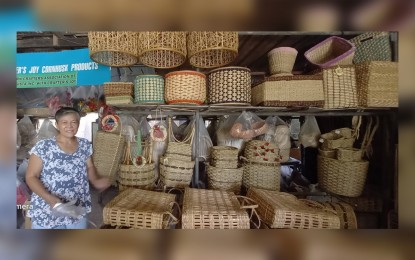
MICRO ENTERPRISE. Getting more housewives into entrepreneurship is a good way to fight poverty, UST economics department chair Carlos Manapat said on Thursday (Aug. 24, 2023). Jocelyn Ong-Perez, owner of Crafters Joy Cornhusk Products, is seen in this undated photo with her merchandise, which she said helped her get through the pandemic. (Photo by Joann Villanueva)
MANILA – Economists and businessmen agree that the government can employ creative measures to cushion the lingering economic effects of the Covid-19 pandemic as well as recent inflation surges.
They were reacting to an Asian Development Bank (ADB) report released Thursday, saying high inflation and pandemic-spawned livelihood disruptions are “continuing to push people in Asia and the Pacific into extreme poverty.”
“An estimated 155.2 million people in developing Asia and the Pacific, or 3.9 percent of the region’s population, lived in extreme poverty as of last year,” according to the ADB’s Key Indicators for Asia and the Pacific 2023 study.
In an interview, Carlos Manapat, chair of the economics department at the University of Santo Tomas, said policymakers should help struggling Filipinos raise their household incomes through entrepreneurship.
He said stay-at-home wives should be “empowered” by helping them establish small businesses to augment the often modest income generated by their working husbands.
Manapat noted that government financial institutions should be mobilized to extend credit and other easy financing options to low-income families seeking to go into business.
“We have to give them (low-income Filipinos) access to quality employment and other perks… such as health cards, free education, among others. But we have to accept that poverty cannot be completely eradicated,” he said in Filipino.
He also said an uptick in inflation towards the end of the year should not be considered alarming, as it is cyclical in nature.
He pointed out that the third quarter is a time for stockpiling inventories, while the fourth quarter sees hefty holiday spending – all of which serve to create price pressures.
Meanwhile, Francis Chua, chairman emeritus of the Philippine Chamber of Commerce and Industry (PCCI), said the ADB study needs further validation.
He said the Philippine government, like almost every other administration in the region, has, for the past three years, been taking various steps to shield their population from the pandemic’s economic fallout.
Chua said programs like the establishment of Kadiwa stores, which sell basic commodities at subsidized prices, have been effective in mitigating the impact of recent economic disruptions.
“I think the government is taking care of its citizens,” he added.
Albert Park, the ADB’s chief economist said in a statement, “Asia and the Pacific is steadily recovering from the Covid-19 pandemic, but the increased cost-of-living crisis is undermining progress toward eliminating poverty.”
“By strengthening social safety nets for the poor and fostering investment and innovation that creates opportunities for growth and employment, governments in the region can get back on track,” he said. (PNA)
